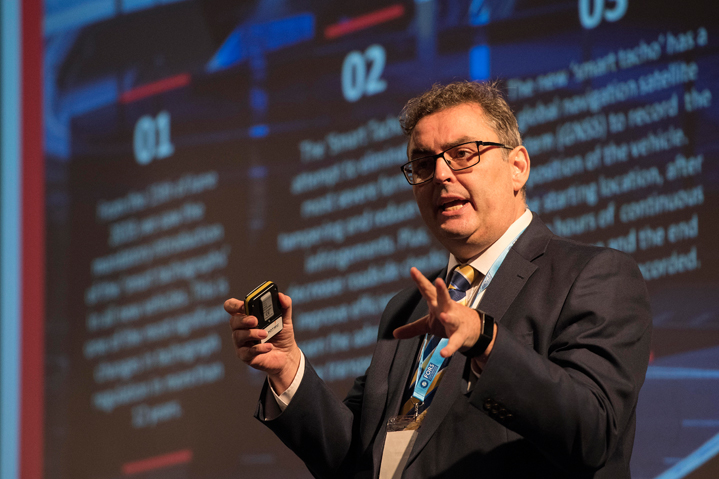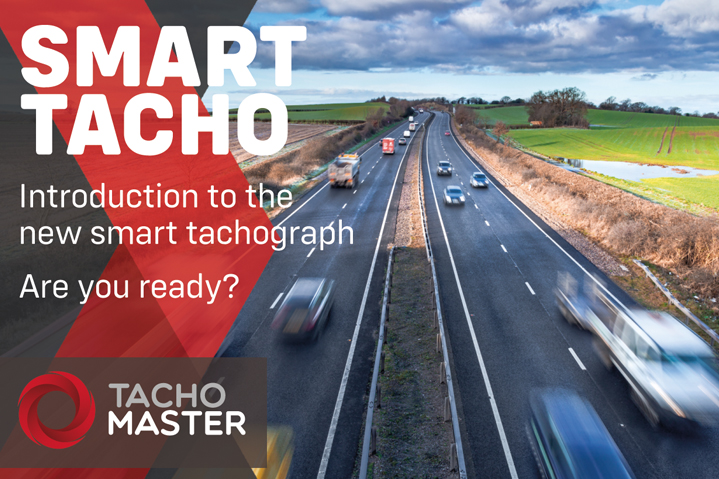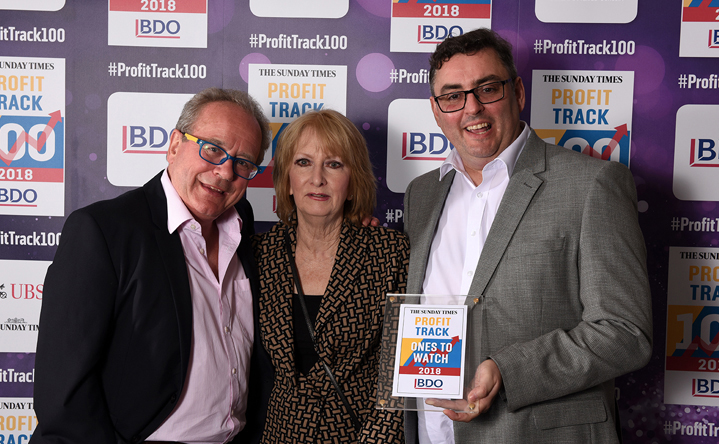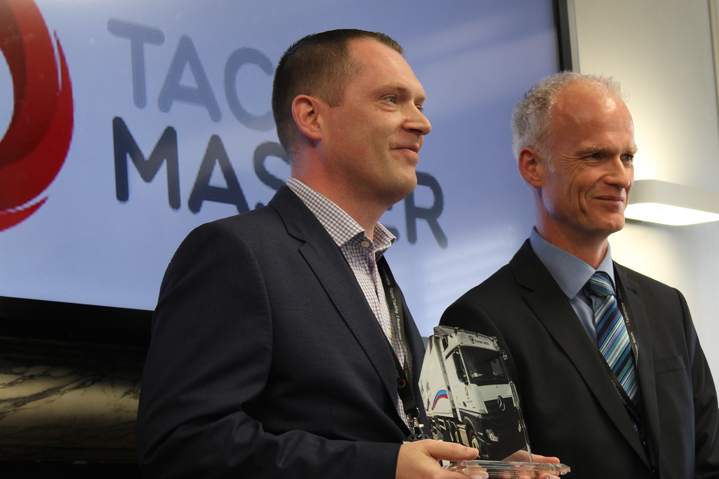This is how we work. We provide our customers with innovation - not just software products and services. We have the most advanced software solutions for the transport industry and through our research and development, we are constantly adding to what we offer.
In early 2025, Road Tech achieved three major milestones, and we celebrated this achievement in-house by running a sweepstakes for our employees. Our first place winner was one of our Software Developers, who won a 55" OLED TV.
The three milestones were:
Tachomaster having processed the 300 millionth upload. That's on average over 70,000 uploads every day since we hit the 100 million upload
PreDrive has received over 10 million reports. We currently receive on average over 35,000 reports weekly.
And Road Tech have achieved ISO 27001 certification. That means we have met this international standard for having robust information security practices, and a framework to review, maintain and continually improve our information security management system.
At Road Tech, we are continually improving and developing our software, infrastructure, and processes to meet the demands and rigour of the business needs for today and for tomorrow.

The fourth annual FORS Members Conference themed ‘Safer, Smarter, Greener,’ was a massive success and saw over 450 delegates packed into the National Conference Centre in Solihull.
The conference revealed the increasing demand for the transport industry to be safer, smarter and greener. The one-day event had several expert guest speeches from across the industry including our very own director Adrian Barrett from Road Tech.
Adrian was asked to share the latest information about the new Smart Tachograph (Gen 2) device, one of the most significant changes in tachograph regulation in more than 12 years.
The majority of Adrian’s speech highlighted the real benefits of the NEW second generation ‘Smart Tacho’ that has been designed to eliminate the most severe forms of tampering, boost driver safety and reduce driver infringements.
The new ‘Smart Tacho’ has incorporated several new changes due to the advances in digital technologies, and these improvements will help streamline the admin and compliance of all tachograph data.
The new ‘Smart Tacho’ will see the introduction of the latest version of the GPS (GNSS) to record the positioning and tracking of your vehicles. The starting location, the following three hours of driving time and the end location will be tracked and recorded.
The new device will also allow the DVSA roadside enforcement officers and police to remotely scan passing vehicles, without having to stop them and detect possible fraudulent activity. The added benefit for companies is the decrease in roadside checks, the improvement in efficiency and the reduction of administrative burdens for your transport operations.
At Road Tech, we are continually improving and developing our software to help our customers improve their road safety, compliance and manage their daily operations more efficiently. Companies that embrace the latest technology and software see the most significant benefits.
If you want to know more then get in touch with us on 01923 460000 or visit www.roadtech.co.uk.
For more information about FORS visit www.fors-online.co.uk.
Our software products include:

Tachomaster Tachograph Generation 2 Compatibility Guide
From the 15th of June 2019, we will see the mandatory introduction of the ‘smart tachographs’ (Commission Implementing Regulation (EU) 2016/799 - Annex 1C) in all new vehicles. This will be one of the most significant changes in tachograph regulation in more than 12 years.
The next new version of tachograph, known as the 'Smart Tacho’ or 'Generation 2 Tacho (Gen2)' will add additional features for improved driver activity records. All new trucks, coaches and buses will have the new ‘Smart Tacho’ device fitted and installed as standard.
The current tachograph devices are fitted to six million trucks and buses throughout the EU. The Tachograph was designed to allow a driver’s activity to be monitored to create safe working conditions, prevent fatigue and protect public safety.
Under EU legislation Annex 1C, all new trucks from June 2019 will require smart tachographs as standard. The new ‘Smart Tacho’ has been designed to improve efficiency and reduce the administrative burdens on the transport industries (covering both goods and passenger vehicles). Also, it will eliminate the most severe forms of tampering and help reduce driver infringements.
Adrian Barrett, Director at Road Tech, explains: “Firstly, we want to make sure our Tachomaster customers know we're ready for the new ‘Smart Tacho’ changes. Also, the principal legislation requirements are the same for existing tachographs and the new ‘Smart Tacho’. Fleets and drivers will still be required to comply with the Drivers’ Hours Legislation and Working Time Directive. All tachograph driver and vehicle data will still need to be downloaded, stored and analysed”.
Generally, the new changes are straight forward, so you won’t need any additional training. However, drivers might want to familiarise themselves with the new features on offer.
On Thursday 7th June Road Tech were guests at the Sunday Times Fast Track 100 Awards Dinner at the Savoy Hotel in London. The annual awards dinner is a celebration of Britain’s fastest-growing private companies which are making the most of the UK's talents, skills and entrepreneurial spirit.
Everyone at Road Tech has been instrumental in our success and was therefore, delighted to receive the news that we had been selected as one of the ten companies in the "Ones to Watch" category, beating off some very stiff competition.
From the right, Adrian Barrett and Maureen Ballance from Road Tech, and Iain Anderson, Joint Managing Director of GAP Group and an Alumni of the awards.


Celebrating Road Tech's landmark 100 millionth Tachomaster tachograph download, achieved in only eleven years, making it the undisputed market leader.
A delegation of industry experts joined Road Tech to discuss the latest developments in compliance technology and to celebrate the 100 millionth download to its Tachomaster tachograph analysis system.
Road Tech has built a reputation for supplying innovative and reliable market-leading software solutions for the transport industry and spent years developing Tachomaster before it’s launch in 2006. When launched Tachomaster didn’t have a single customer however, it quickly took the transport industry by storm and revolutionised the tachograph analysis market.
Eleven years later and Tachomaster has over 6000 customers and has analysed over 100 million card, chart and vehicle downloads. The landmark download was received from Fowler Welch, a well-known haulier based in Lincolnshire, who are a long-term customer of Road Tech’s.
John Kerrigan Chief Operating Officer of Fowler Welch received a commemorative trophy for the 100 millionth download from the DVSA’s Head of Enforcement Policy, Gordon Macdonald, at Road Tech’s head office at Shenley Hall. John said: “We have recorded one million Tachomaster downloads and are proud of our compliance, we work hard at it. “At one time, making money was more important than compliance but now, working with Tachomaster, we have embraced this system and become much more efficient. “Technology will be a key part of our future and we will work with Road Tech as they develop even more sophisticated remote download systems, which we understand will include high security driver profile links to the DVSA Earned Recognition Scheme and the futuristic sounding Tachomaster Live.”
Among the industry big hitters was Ian Jones, Director of the highly respected transport solicitors Backhouse Jones. Ian said: “That, in my humble opinion, it would be political suicide to reduce the regulations operators are subjected to, as nobody wants another Bath tipper or, Glasgow bin incident.”
Gordon McDonald, Head Of Enforcement Policy at the DVSA said: “Services that Tachomaster provide, make it easier to be compliant.” He went on to say: “That the Earned Recognition Scheme can identify the best operators, by giving them the recognition they deserve and that Road Tech’s products and services allow operators to manage their systems for Earned Recognition.”
John Hix, Regional Director of FORS said: “Derek Beevor and his team had a vision and that they anticipated rather than reacted to the seismic shift to digital tachographs, stressing the close working relationship between Road Tech and FORS.”
Tachomaster has transformed the industry and helped its customers to improve and manage their compliance, reduce infringements and control their drivers more effectively. Tachomaster gives its customers instant real-time analysis, unrivalled management reporting, a twenty-eight day free trial and there is no contract to sign.
For more information visit www.tachomaster.co.uk

Road Tech will be exhibiting again at this years Commercial Vehicle Show, the best attended, largest and the most comprehensive road transport and commercial vehicle event of the year.
The CV Show attracts over 20,000 visitors, is a free-to-attend three day show and is an opportunity for everyone to see the latest vehicles, services, products and high-tech software innovations available.
We will be in hall 4 showcasing our latest software with our staff members on hand to offer expert advice, information and live demonstrations of our five software products. You will be able to see how our agile and intuitive software can simplify real-time information and helps keep drivers and vehicles safe, secure and DVSA compliant.
Whether you manage a few vehicles or a multi-depot fleet, Road Tech's powerful market-leading software solutions will provide you with real insight and control over your two most expensive assets: your vehicles and drivers.
Come and find us in Hall 4, stand 4J55 and have a friendly chat about how Road Tech can help your business.
For more information and FREE tickets to the CV Show click here.
Our software products include:
If you want to know more then get in touch with us on 01923 460000 or email sales@roadtech.co.uk.

The DVSA has recently launched a new combined traffic and roadworthiness score to its Operator Compliance Risk Score (OCRS) system to help tackle those who pose the greatest risk. The system is based on data collected by DVSA over a 3-year rolling period. Data is taken from annual tests, roadside inspections and inspections at operators' premises.
The scores are split into two categories, and a combined score is given for:
As an operator you get points when a test or inspection finds a defect or infringement of the rules. The more serious the defect or infringement, the more points you will receive. Your points will translated into a score system, which will be shown as R (red-highest risk), A (amber-medium risk) or G (green-lowest risk).
The primary goal is to focus roadside enforcement on operators who pose the highest risk to the public. The new system allows the DVSA to target those operators and can reduce the likelihood of roadside inspections for compliant operators who have gained the ‘earned recognition’ from the DVSA.
Technology has a vital part to play in helping to ensure that operators are compliant. Using tachograph analysis software like Tachomaster will help transport operators to improve and manage their compliance issues. It can assist in reducing infringements, helps manage irresponsible individuals and control their drivers more effectively.
Please take note that analysis is merely the means to an end. The objective is to make use of the information. Only this will persuade the DSVA that an operator has "taken all reasonable steps to prevent breaches of the rules."
Did you know that it’s estimated that 85% of roadside infringement offences could have been avoided if the driver conducted a walk around vehicle check before commencing the journey.
Once again, technology can help operators stay compliant and reduce their workload. Using a smartphone to complete your walk around vehicle checks is a much saver alternative to the traditional paper checklists. Using a smartphone app like PreDrive to track, report and analyse defects in real time is easier, quicker and safer for everyone.
By putting compliance at the top of your agenda, you can reduce time, dreaded inspections, prevent paper errors, and save your business time and money. So why don’t you eradicate inefficiencies within your business today and increase your drivers' safety, security and compliance by giving us a call.
For more information on our tachograph analysis software visit Tachomaster or for information on our paperless walk around vehicle checking software visit PreDrive. Or get in touch with us directly on 01923 46 00 00 or email sales@roadtech.co.uk.

The chancellor, Philip Hammond, announced that an extra £1.3 billion will be spent in 2017 to improve Britain’s roads and cut congestion. The idea behind this splurge is that it will help to boost and stabilise the economy after the turbulence of Brexit.
What are the reasons behind this investment? Phillip Hammond wanted to tackle projects that would make a visible and immediate impact to improve the lives of the taxpayer. Phillip Hammond believes that addressing the issues with our roads and infrastructure will provide a long-term boost to the economy that will benefit the taxpayers now.
Commuters are faced with increasing difficulties in their journeys; the government is aware of both this and the alarming statistic that between now and 2040 over 100 million working days are expected to be lost due to traffic congestion. These lost working days cost households £13 billion every year, which is putting substantial pressure on families that have now been dubbed the ‘Just About Managing’ or Jams.
Investing heavily in Britain’s roads will boost the productivity and utilise the skills that Britain has, including research and design to provide innovative infrastructure solutions. In addition to the short-term gains of employment there will long-term benefits such as an increase in the productivity of the nation by reducing the amount of time spent in congestion and traffic jams, as well as improving the speed and networks across Britain. All of this will result in the reduction of “time off” and delays in delivery of goods and services thus allowing business to operate more efficiently.
It is thought by improving the infrastructure we can help industries across Britain. This will be a necessary in order to allow the UK to prosper on the world stage once we have left the European Union.
How will the money be spent? The Chancellor has outlined that £27 million will be used to fund a new expressway that has been planned between Oxford, Milton Keynes and Cambridge. All of which are important technological and innovation hubs that are hoped to accelerate economic growth.
£220 million has been put aside to help tackle traffic “pinch-points” across England on Highways England roads. This will assist to reduce common delays and benefit the long-suffering commuter.
£1.1 billion is going to be used to reduce congestion and to conduct important upgrades on the transport networks and on local roads.
Will it be successful? The reason for this investment is to make an immediate impact that uses taxpayer’s money wisely and improves the journeys for millions of commuters. Will commuters be able to see the difference and will the money be utilised in the right places? We will have to see what 2017 holds for us and our roads.

On 5th December 2016, the Ministry of Justice put forward a new proposal for the government to introduce life sentences for causing death by dangerous driving. This would mean a potential life sentence for drivers who cause death by speeding, using a mobile phone while driving or street racing. The Ministry of Justice would also like to introduce life sentences for offenders who cause death by careless driving who are under the influence of drink or drugs. However, will an introduction of tougher sentences make our roads safer and is it fair for drivers to face life sentences?
‘Immeasurable Pain To Families.’ The Ministry of Justice has put forward a plan for tougher sentences to deter criminal behaviour on the roads. Currently, the maximum term of imprisonment a dangerous or careless driver will receive is 14 years. By raising the maximum punishment to life imprisonment, Justice Ministers hope it will be a strong deterrent, but also ensure that the punishment fits the crime, as the new proposal will see death by dangerous driving carry the same sentence as manslaughter.
There has been a string of high-profile cases where dangerous drivers have been given perceivably lenient sentences despite killing children and sometimes whole families. Victim’s families and road safety charities have long campaigned to bring about a change in the law to ensure dangerous drivers receive the hardest sentences. Justice Minister, Sam Gyimah explains: “Killer drivers ruin lives. Their actions cause immeasurable pain to families, who must endure tragic, unnecessary losses.”
It is thought that increasing the maximum sentence would help to bring justice to the families of victims and help to ease the anger, while understanding that it’s impossible to provide compensation for the death of a loved one.
Dependent On The Level Of Culpability? Some people do not agree with this proposal and believe that sentences should be equal to the degree of culpability. Introducting different levels of culpability would obscure the lines of the law and make it harder to sentence careless or dangerous drivers.
Others do not believe that changing the offence to the same level as manslaughter would have any effect on sentencing or deterring dangerous drivers. Although the maximum sentence for dangerous driving is 14 years, the average custodial sentence for convicted dangerous drivers in 2015 was just 45.8 months, just under four years. This shows that introducing a higher sentence, does not necessarily mean that drivers will face tougher penalties. As always, sentence length is a matter for judges to consider, once they have established the full facts of each case independently.
What Happens Now? As well as the Ministry of Justice proposals, the Department of Transport is also introducing separate legislation for using a mobile phone while driving. The Department for Transport are increasing the fixed penalty fine from £100 to £200 and also doubling the number of penalty points from three to six points.
For the Ministry of Justice proposal, the consultation runs until 01 February 2017. After this, Cabinet Ministers must review the consultation and decide what proposals they wish to take forward. Once approved this will be made into a bill for Parliament scrutinisation, which will, if it receives approval from the Lords and the Commons, be made into an Act of Parliament or law. This means we may still have a long way to go before we know if there is a decision on sentencing for death by dangerous drivers.
Read more here from the Minisrty of Justice

It is predicted that road accidents involving drivers with poor vision cost the UK around £33 million and cause 2900 casualties every year. Having good eyesight is critical to safe driving and it is a requirement by law that drivers must be able to read a modern car number plate that is 20 metres away.
For most drivers, their eyesight is only tested during the practical element of their driving tests, which is when a driver must read a number plate from 20 metres away. Other than this test, most drivers do not have to provide any further evidence to prove that their eyesight is acceptable for driving. Eyesight can deteriorate quickly, and most people will not be aware of the change in their vision but does this mean that a law to ensure regular eye tests for drivers should be passed?
What The Law States As well as the law stipulating that drivers must be able to read a number plate from 20 metres away. The law also requires drivers to inform the DVLA if their vision is below 6/12 (0.5) on the Snellen scale or if their visual field is less than 1200, for this measurement, drivers can wear contact lenses or glasses if they require them. This also means that if a person needs glasses or contact lenses to meet the vision standards for driving, then glasses or contact lenses must be worn every time that person drives.
The DVLA will also need to be informed if drivers suffer from medical conditions that can impact their eyesight as well as their ability to drive safely. For drivers older than 70, they must declare to the DVLA that their vision meets minimum standards, but there is no need to supply the evidence for this.
There is more stringent laws applying to lorry and bus drivers who must have a visual acuity of at least 6/7.5 (0.8) on the Snellen scale for your strongest eye and at least 6/60 (0.1) on the scale for the other eye.
What Opticians State As eyesight can often deteriorate without notice, experts recommend that drivers should have a professional eye test every two years or sooner if a problem arises. However, eyesight tests are not compulsory, and most people will only go to an optician if they think there is a significant problem. Most will not notice a gradual deterioration or recognise this as a sign that they may not be driving safely.
A professional eye test covers vision over distance as well as central and peripheral vision and also visual field. This is an interesting point to note that drivers with visual field issues have double the number of road crashes or traffic violation than those with a full visual field, yet a person’s visual field is not checked during a driving test.
What Road Safety Charities Believe Road safety charities such as Brake and GEM are campaigning for the government to introduce tougher laws to check driver eyesight. They believe that regular compulsory eye testing would help to cut collisions and make roads safer. Recent studies conducted by Brake suggest that over 1.5 million licence holders in the UK have never had their eyesight tested, which is understandably a cause for concern for such charities.
With all campaigns, the challenge of implementation and continuation is a hard battle to fight. To ensure regular testing for all drivers is a difficult task enough but would this also bring about a change in the requirements of the practical driving test as well as a need for better visual accuracy?